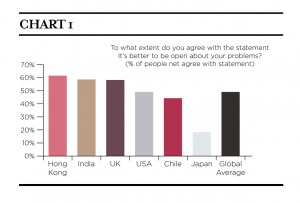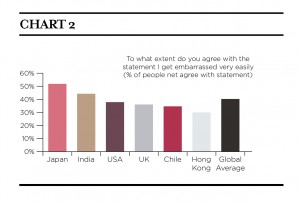Dave McCaughan
Views about privacy are diverse, complex and fluid; this impacts what consumers expect from businesses.
Universal technology access, social networking, the increased openness of celebrity culture, and the subsequent end of embarrassment are changing the boundaries of what is private, what we are willing to share and who we want to spy on. Understanding more about how people around the world feel about privacy just makes sense.
Last September, McCann Worldgroup’s Truth Central team undertook a study looking into the truth about privacy, and how people’s thinking about what is private might be evolving. The study involved in-depth discussions with people aged 15 to 60 in 17 countries, and a detailed survey of 1,000 respondents in the USA, UK, Japan, Hong Kong, India and Chile. The results clearly show that that privacy is just not the same anymore, anywhere.
We found that people who do not participate in social media now feel a need to defend that decision because it is, well, odd not to. The result is both a heightened awareness of the ability to share and a growing awareness of the risk that you’re being spied upon.
If we look at the hierarchy of privacy concerns, financial data, unsurprisingly, tops the list. Beyond that, our fears are largely personal, often related to snooping by our friends, families and colleagues. Technology has created a more fluid and borderless world, with less distinction between public and private. People have an expectation of privacy with regard to their own lives, while readily confessing to snooping on others. 42% admitted to studying the online personal photographs of someone they hardly knew, and 25% had read a friend or partner’s e-mail or text messages without them knowing.
 Privacy patterns
Privacy patterns
While privacy concerns are universal, there are distinct patterns. People in southern or developing countries like India and Chile are more open to sharing, while those in northern developed markets like the USA and UK are much less so. Japan, where I reside, is the least open. Chart 1 shows that, while over 50% of people worldwide generally agree that “it’s better to be open about your problems,” less than 20% in Japan concur. When we asked whether sharing one’s thoughts, opinions or favourite videos is a cool thing to do, globally 60% of respondents agreed, compared to just 30% in Japan.
 Social pressure not to stand out might be one reason for this discrepancy, but it also clearly connected to the apparent tendency of people in Japan to be relatively easily embarrassed. As Chart 2 shows, over 50% of Japanese respondents agreed with the statement “I get embarrassed very easily,” ten points more than the global average. Around a quarter of respondents worldwide agreed that if they shared more personal information on-line they would get ahead in their careers, rising to over 40% in countries like India and Chile. This compares to just 10% of people in Japan.
Social pressure not to stand out might be one reason for this discrepancy, but it also clearly connected to the apparent tendency of people in Japan to be relatively easily embarrassed. As Chart 2 shows, over 50% of Japanese respondents agreed with the statement “I get embarrassed very easily,” ten points more than the global average. Around a quarter of respondents worldwide agreed that if they shared more personal information on-line they would get ahead in their careers, rising to over 40% in countries like India and Chile. This compares to just 10% of people in Japan.
What emerges from the study is a new understanding of privacy as a complex, multi-dimensional issue that encompasses everything from personal, real-world snooping to sharing data online. Data-sharing clearly falls into different categories – shopping, location, personal, medical, financial, etc. – with varying degrees of concern adhering to each type. 71% of respondents worldwide indicate they are willing to share shopping data with a brand online; 86% say there are major benefits associated with sharing data with businesses online; and 65% see one of the top two benefits as better access to discounts and tailor-made promotions.
The privacy issue is a bright spot in otherwise dark times for banks, which are trusted by 69% of consumers globally to look after their personal data and use it wisely. 57% hold credit card companies in the same regard. Banks and other financial services brands have distinguished themselves from other sectors because they have consistently demonstrated a commitment to data protection. 44% of US consumers say that security controls are one of the top three reasons why banks have earned their trust (the other two being a history of dealing responsibly with data, and a confidence that banks will protect them in case of fraud). Globally, the top three most trusted brands are MasterCard, Visa and Microsoft – brands that are generally credited with high levels of security (despite some high-profile database breaches).
What businesses need to know
There are four key privacy dynamics when it comes to maintaining a proactive, productive and share-worthy relationship with potential consumers: control, choice, commitment and compensation. 55% of people cite a commitment from companies that their personal data (eg, e-mail addresses, phone numbers) won’t be passed onto third parties as one of their top three most important criteria when deciding whether to trust a brand.
51% of respondents say it is important to know exactly how their data will be used, and 49% want to be in control of which data they share. They also want compensation, a reason to share data, and an understanding of how they will benefit. 72% of US consumers trust Amazon to look after their data and use it wisely. It is the most trusted brand in the US since, more than with any other company, consumers can see how it uses data to make relevant suggestions.
In a world where social networking is a normal part of everyday life, people spend more and more time managing their online brands. They admit to multiple online personalities, ranging from a ‘virtuous me,’ with information suitable for family and employers, to a ‘popular me,’ where they include items to impress friends and social acquaintances. This is a challenge for brands, which will need to understand which version of their consumer they are interacting with.
The rise of the savvy shopper
Looking at the spectrum of attitudes toward privacy, our study identified five distinct segments: Eager Extroverts (15%); Sunny Sharers (20%); Savvy Shoppers (37%); Cautious Communicators (9%); and Walled Worriers (19%).
Savvy Shoppers embody a nuanced approach to this brave new world of sharing. They are willing to engage with businesses in exchange for a commitment to security and compensation in the form of discounts or preferred status. Not surprisingly, the countries with the highest penetration and longest history of high-end phones with internet access (Japan and Hong Kong) were those where the percentage of Savvy Shoppers topped 50%.
86% of all people globally understand that there are major benefits associated with sharing data with businesses online, and 71% are most willing to share their shopping data. For 65%, one of the top two benefits is better access to discounts and promotions, a very Savvy Shopper mentality.
84% of people believe they have some or complete rights to privacy, but only 51% believe the same applies to people in the government who, it seems, must trade privacy for power. Similarly, only 57% of consumers believe a brand or business has a right to privacy. 65% of consumers say a reality TV star has a right to privacy; the other 35% seem to believe that that star has traded his or her private life for fame and fortune.
Increasingly, governments and businesses will need to recognise that privacy is a two-way street. Consumers may be willing to share more of their personal information to gain benefits, but they expect much more transparency in return.
Dave McCaughan is director of strategic planning at McCann Worldgroup Asia Pacific.


